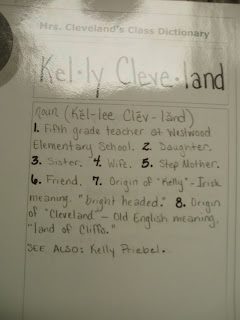I've got to give credit to a fabulous fellow from the Middle Tennessee Writing Institute for this idea. Kelly Cleveland shared this idea with our group this summer. Teaching 2nd and 3rd grade students about reference books is so much easier when they get to write about themselves! We introduced one reference at a time and included the dictionary, thesaurus, atlas, and encyclopedia. After each reference is taught, the students create an entry for that reference all about themselves. After each reference page is created, the students add a front cover, title page, and table of contents for their books. Here are a few pictures of our student work in process:
Here are a few pictures of Kelly's examples that she shared in class this summer.
Here is an example of a dictionary page. Our dictionary page included syllabication, pronunciation, and the part of speech for the student and their name. I also created a box for a picture of the student. The students had to think of at least five ways to define themselves. My favorite from a second grader was, "future big sister!" If the student knew the origin of their name, they also included it.
Here are two examples of a thesaurus page. I had the kids list four adjectives that described themselves. They then had to use a thesaurus to look up synonyms and antonyms for those adjectives.
Four our atlas page, I printed a blank copy of the United States from Enchanted Learning. I gave each student an atlas and they used the political map of the United States to label what they wanted about themselves using symbols on the map. They had to create a key for the map so the reader could understand what the symbols meant. Some of the topics the students chose were:
- places they've lived
- where they were born
- where they'd like to visit
- where relatives live
- places they haven't visited
- places they have vacationed

Before creating an encyclopedia page, I had the students study entries in the encyclopedia and tell me how they were formatted. They noticed that the year the person was born and died were in parentheses. They also noticed the headings that helped the reader know how the information was organized. They said that the information was in order like a timeline in the encyclopedia. We also discussed that you don't have to be dead to be in the encyclopedia and it is not likely that you will find your mom in it, either!
When publishing their encyclopedia page, I had the 2nd and 3rd grade students choose three headings that would tell about their life and accomplishments.
We also used this opportunity to compare the encyclopedia in print and the encyclopedia online.
The Tennessee Electronic Library offers World Book for free to any resident in Tennessee, so we compared with World Book Online.








No comments:
Post a Comment